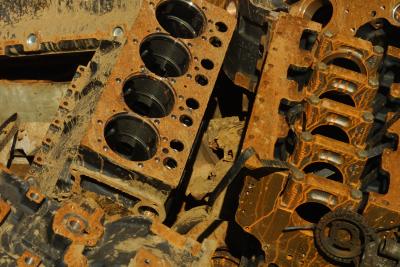
There are a number indicators of cylinder wall damage that can be heard and seen as your car is operated. If the gap between the cylinders and the pistons is too great, you can hear a sound known as "piston slap." If your engine is using more than one quart of oil every thousand miles, there probably is damage to the piston rings and damage to the cylinder walls.
Cylinder walls are lubricated as the rotating crankshaft picks up oil from the oil pan and flings it up on the cylinder walls. As the piston is forced down during the combustion stroke, oil rings on each piston scrape excess oil off the cylinder wall, leaving a thin oil layer of hydrodynamic lubrication. This layer of oil is what protects your engine cylinder walls from damage. If you allow your engine to operate with insufficient oil in the pan, the result is cylinder wall damage.
Normal operating temperature for automobile and pickup engines is 195 to 220 degrees Fahrenheit. Generally, when engine temperature reaches 280 degrees Fahrenheit, internal engine parts begin to expand, causing metal-to-metal contact between moving parts. Metal-to-metal contact with cylinder walls damages both the piston and the cylinder wall. Continued engine operation at temperatures of 280 degrees Fahrenheit may cause pistons to seize in the cylinder. Serious cylinder and piston damage may occur the first time your car is allowed to overheat.
Dirt and contamination can enter an engine cylinder from a number of different sources. Dirty engine oil splashed up on cylinder walls during engine operation may cause the surface to be scored as the piston moves up and down. Carbon deposits around the valves may break off during combustion and cause damage to cylinder walls. Piston rings may break if you allow the engine to operate at too high of engine revolutions, creating small pieces of metal that damage cylinder walls.
Piston slap damage occurs at the upper and lower limits of the piston's travel in the cylinder. As the engine ages, the clearance between pistons and cylinder walls increases. As each piston reaches the upper or lower limit of travel within the cylinder, the pistons pivot on the piston pin that attaches the piston to the connecting rod. This rotation causes excessive wear on the cylinder wall as each piston "slaps" into the cylinder wall. Piston slap makes a sound that can be diagnosed by an experience auto repair technician.